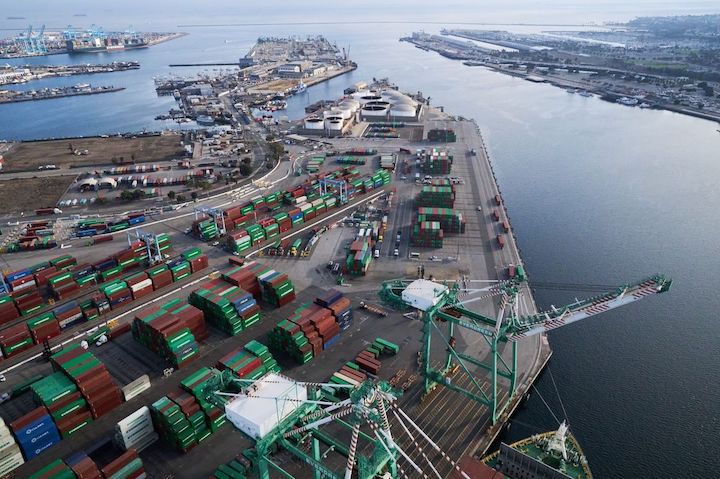
On April 7th, the twenty-four-hour shutdown of the Ports of Los Angeles and Long Beach sparked concerns by U.S. agricultural exporters that such stoppages could expand and result in the permanent loss of foreign customers.
On Friday evening April 7th, members of International Longshore and Warehouse Union (ILWU) Local 13 returned to work.
The Local 13 statement added that on April 7th, their members had been engaged in a Good Friday religious holiday observance and not a work stoppage: “On Friday, April 7, 2023, (Local 13) union members who observe religious holidays took the opportunity to celebrate with their families. Cargo operations are ongoing as longshore workers at the Ports remain on the job.”
Impact On Exporters
At the same time, Peter Friedmann, Executive Director, of Agriculture Transportation Coalition (AGTC), warned about the worsening impact on U.S. agricultural exports: “This morning, over 9 months since the expiration of the ILWU-PMA longshore labor/marine terminal contract, the marine terminals at the ports of Los Angeles and Long Beach, the largest port complex in the Western Hemisphere, sit idle. Starting yesterday, agriculture exporters started feeling the pain, reporting terminals were closed. Immediately, our agriculture exporters have been dramatically injured.”
Friedmann’s statement went on to cite the impact of the work stoppage on an agricultural exporter who fears the loss of a foreign customer: “I wanted to pass along the financial impact to our company with LBCT not receiving loads last night. We had 10 trucks turned away and stored the containers in a yard close to the port. We figure the cost to us was $2,000 per container, a total $20,000.
The costs were for trucking the container to the terminal from our plant 200 miles, (and) storing the containers. As the trucks could not get empty containers, we will have to pay trucks to deadhead from our plant again, to deliver the loaded containers and retrieve empty containers.
This has not only eliminated our profit from this international sale, it turned it into a substantial loss, but we have to keep it moving because the product is loaded, there’s no place to put it, or use it, and if we don’t deliver, we lose the foreign customer, perhaps permanently.”
PMA Says ILWU Is Escalating Work Stoppages
On April 7th, the Pacific Maritime Association, which represents West Coast maritime terminal operators, charged that ILWU Local 13 withheld labor and “effectively shut down the Ports of Los Angeles and Long Beach” adding: “The largest ILWU local on the West Coast has taken a concerted action to withhold labor at the Ports of Los Angeles and Long Beach, resulting in widespread worker shortages. A majority of the jobs for last night’s shift went unfilled, including all jobs for cargo-handling equipment operators needed to load and unload cargo. The workers who did show up were released because there was not a full complement of ILWU members to operate the terminals.
ILWU Local 13 withheld labor again for this morning’s shift. The action by the Union has effectively shut down the Ports of Los Angeles and Long Beach – the largest gateway for maritime trade in the United States.
The Union’s coordinated actions are occurring while negotiations for a new coastwise contract continue. This latest work action comes three weeks after ILWU Local 13 in Southern California stopped complying with a contract provision providing employers the right to assign staggered shifts during meal periods.
These actions undermine confidence in West Coast ports and threaten to further accelerate the diversion of discretionary cargo to Atlantic and Gulf Coast ports. The health of the Southern California and state economy depend on the ability of the Ports of Los Angeles and Long Beach to stem this market share erosion.”
ILWU Opposes Automation Provision It Agreed To In 2008
The ILWU is opposing the automation of West Coast container terminals, even though the union had previously agreed to the practice back in 2008.
A 2022 PMA-sponsored study showing the automation had actually resulted in an increase in ILWU jobs drew a negative rejoinder from Frank Ponce De Leon, ILWU Coast Committeeman: “It’s apparent that the report is a self-serving document by one party to a labor contract, and even worse is an insult to all workers who have seen their jobs outsourced to machines.”
James McKenna, President of the PMA recalled at a 2022 Port of Los Angeles media briefing that the ILWU had previously agreed to the automation of marine terminals: “In 2008 we did the automation agreement. It was a big deal…One of those issues that you thought was going to be tough to overcome. We actually settled that contract three weeks after it expired without disruption.”

